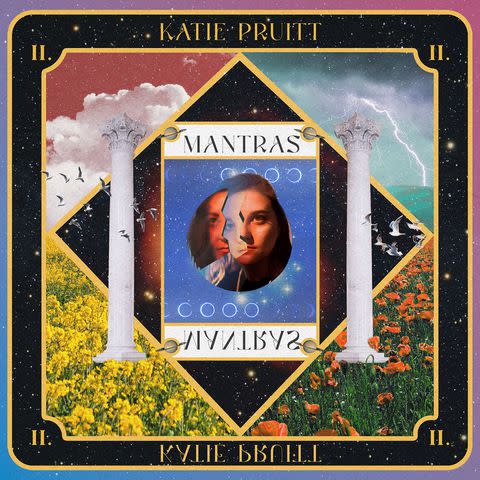Katie Pruitt Discovers the Power of Letting Go: 'I Was Putting a Lot of Pressure on Myself' (Exclusive)
- Oops!Something went wrong.Please try again later.
- Oops!Something went wrong.Please try again later.
Four years after debut album's splash, the singer-songwriter pushes through her follow-up jitters and delivers bold new music in 'Mantras'
In hindsight, Katie Pruitt’s decision to name her debut album Expectations was either brilliant or crazy — or both.
After its 2020 release, it did everything to live up to its name. Critical praise showered like confetti: “genius,” “dazzling,” “earth-shattering.” On tour after the COVID quarantine lifted, Pruitt was rewarded with worshipful crowds who sang back every word of her sharp lyrics. The warm reception gained her spots on "ones to watch" lists, opening dates with Brandi Carlile and a nomination for emerging act of the year from the Americana Music Association.
The response was so glorious that all Pruitt could feel, as she approached album No. 2, was — here it comes — expectations. And, no, the irony isn’t lost on her; there’s not a lot that gets past her acute mind.
“I don’t know if I expected” — she laughs, catching herself on her word choice — “it [the album] to do what it did and to have the reaction that it had.” Once it did, though, says Pruitt, “I was putting a lot of pressure on myself the second time around to outdo the first record. I was really trying to rush it, and I was trying to force myself to be inspired, and it was hard.”

How much pressure? Enough that it took her four long years to finally release her sophomore album, Mantras, out this month. It’s a sublime collection of worth-the-wait music, brimming with Pruitt’s rare artistry, her relentless drive to self-explore and her insistent urge to take listeners along for the ride. Her journey, though, first had to push her through a therapist’s door and past the “mental roadblocks” — just to get her going again. (“Shout-out MusiCares!” says Pruitt, namechecking a mental health service for the music community.)
The pressure finally diminished, she says, once she understood “that I can’t control any outcome ever … All you can control is yourself. All the love and attention and detail that I pour into the songs is just like you’re throwing it to the wind. And there’s sort of a freedom in that. There’s a freedom of giving up clinging so tightly to all those aspects you can’t control.”
The realization ended up being the overarching theme of Mantras as she set about to wrestle with the subjects that have long captivated her: religion, family, relationships, self-image, fears. It’s all soul-baring stuff for a 30-year-old queer artist who spent her adolescence well acquainted with the closet.
“It’s scary — I mean, I’m not gonna lie,” she says. “But I think it’s scarier when it comes to one-on-one interaction — my friends, my family, my intimate relationships. I would tell a room full of 200 strangers anything about me.”
Pruitt grew up in a loving but strict Catholic household in suburban Atlanta and attended a parochial school. Her sexual orientation quickly butted up against what she was learning from the church. At the same time, she was also being fed by music — Carlile was a pivotal early influence — and her musical mother was teaching her how to sing, harmonize and play the guitar. Once she enrolled in Nashville’s Belmont University, she came out and came into her own, initially winning recognition for her songwriting skill.
The stew of life experiences and influences has left her curious, reflective, skeptical — and constantly tending to her inner life.
“I think that what goes on in your mind is like a projection of what you put out into the world,” she says. “So, if there’s chaos in your mind, you’re going to project chaos. If there’s peace in your mind, you’re going to project peace. So, I’m trying to start there.”
Her lyrics — eight of the 11 tracks are solo writes — attest that the struggle is real, though Pruitt’s stirring melodies and strong, pliable voice are tonic to the pain she often expresses. Her worst internal demons and fears are exposed on two of the tracks, “Self Sabotage” and “Worst Case Scenario.” She tackles her evolving understanding of faith in “All My Friends,” and she pointedly takes on the hypocrisies she finds in organized religion in “White Lies, White Jesus and You”: “ Passing people on the street with picket signs / Warning me of my impending doom / If God’s the one deciding if I make it in / What gives them the power to assume?”
“I’ve done a lot of healing in that area,” says Pruitt, who hosted The Recovering Catholic, a six-episode podcast in 2021. “Yeah, my parents are still very Catholic, and I’ve got friends who are Christian, and on a personal level, I love them all. But on an institutional level and on a global level, it still frustrates me that religion has such a stronghold on politics and in negative ways. I feel — and honestly, a lot of my friends and my family feel — it’s contradictory to what Jesus in the Bible actually says, which is, ‘Accept everybody, love everybody,’ and not ‘Hey, take down that rainbow flag at the school and ban all the books.’”
Pruitt first confronted her complicated feelings about her family in Expectations with “Georgia,” an expression of her disappointments. This time around, in “Blood Related,” she paints a lyrical picture of familial healing. She’s underscored the progress by featuring her mother on background vocals and embedding audio recordings, from old home videos, of her father and brother.
“Yeah, it’s a positive follow-up,” Pruitt confirms. “At the end of the day, I am related to these people, and I want to try to love them through the frustration and learn patience and empathy and all the things that come with having a relationship with them. That was an important song for me to include on the record because I needed them to know that … I don’t know … that I love them.”
Perhaps the most vivid topic threading its way through the album is a relationship on the brink. The song “Leading Actress” has Pruitt “sleeping in the middle of the mattress / thinking about changing up my address / and somehow you are still the leading actress / in the movie of my life.” In “Naïve Again,” she laments there’s “no getting back that innocence / when love was easy.” She makes a plea in “Stand Still”: “But I’d rather be with you / than pretending I don’t miss you / Can we just see this through?”
All are sad contradictions to the memorable love songs of Expectations, and Pruitt confirms that she and her partner of seven years split last summer. The songs on the new album are actually the gathering storm clouds: All were written before the breakup.
“This is probably the hardest thing to talk about,” says Pruitt, and her pauses between words prove her point. “It was a beautiful seven years. And when I was writing this record, I think I was preparing myself to have to let her go. I could just kind of feel that happening naturally. There was a lot of trying to make it work. There was a lot of, you know, we should fight for this.”
Perhaps more than any of the others, the songs of this unraveling reflect the album’s theme of letting go. “The record’s called Mantras, and a mantra that I have practiced is ‘love is the absence of control,’” she says. “It’s heartbreaking, but there’s also an acceptance that I’ve learned through having to let her go, and ultimately, knowing that letting her go is actually the way that I am showing I love her.”
That powerful insight shows up in the chorus of another standout track, “The Waitress.” Notably, Pruitt doesn’t just wallow in her sorrows and anxieties; she’s also a problem-solver. In “Worst Case Scenario,” for instance, she finds another remedy by song’s end: “Positive mantra put it into action / asking myself what’s the worst that can happen? / Once in a while maybe I should / try manifesting something good.”
It's no wonder that Pruitt’s music — and her wisdom — swirl out of the daily journal she keeps. “I think I process pain that way — of just putting pen to paper and really acknowledging what hurts,” she says. “I feel like the first part of my entries are always ramblings and talking about negative things, and then I’m like … but …” She laughs. “That’s kind of how my songs are, to be honest.”

Alysse Gafkjen
Katie PruittAnd her mantra on this particular day?
“Pack for the tour!” she says with another laugh. “I’m grateful. I’m so excited to leave and be gone. I mean, there’s an anxiety to that …”
Of course there is if you’re Katie Pruitt. By now, though, Pruitt knows how to brush it away with the next sentence: “But there’s such adventure and excitement.”
Pruitt is now out on the road, supporting the new album, at dates in the United States, Canada and Great Britain through August; she’s scheduled to appear at Stagecoach Festival April 28.
For more People news, make sure to sign up for our newsletter!
Read the original article on People.

